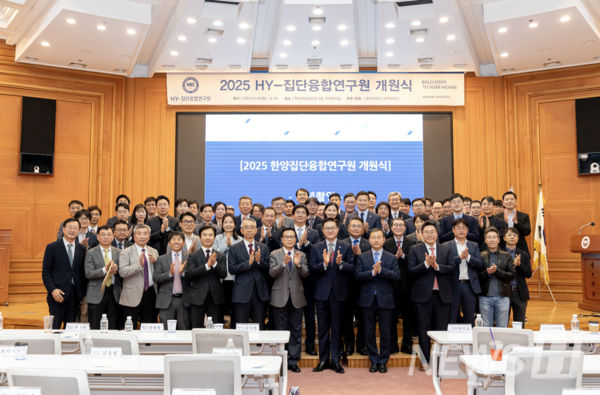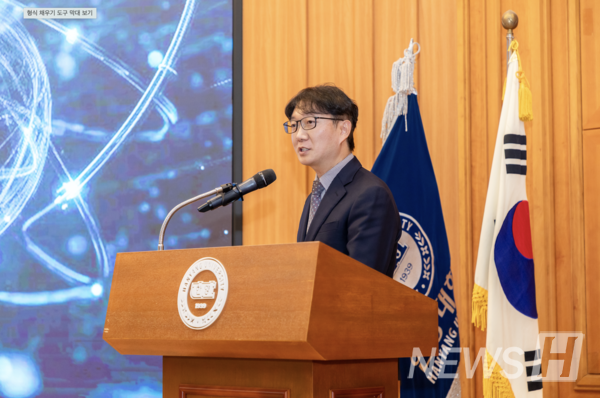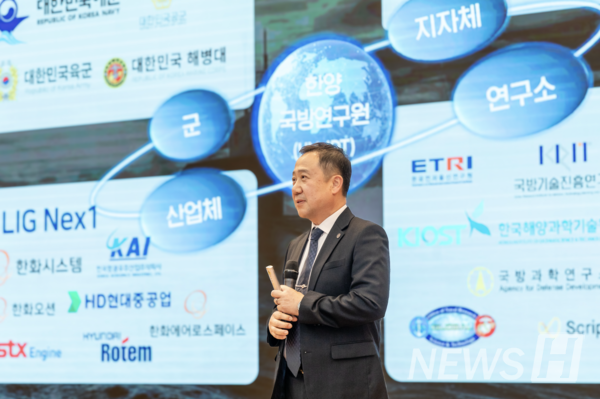HY-Collective Convergence 토토사이트 즐벳 Institute in AI, Quantum, and Defense Fields Opens Breaking Down Boundaries to Design the Future
Hanyang University has launched the HY-Collective Convergence 토토사이트 즐벳 Institute as part of its 2026 University Mid-term Development Plan strategy of <Leaping Forward as a World-Leading 토토사이트 즐벳 University>.
Research institute directors leading the AI·Big Data, quantum, and defense fields emphasized that "communication and collaboration that transcends academic boundaries is the beginning of innovation." In this article, the directors of each institute share their vision, operational plans, and future goals for convergent research at Hanyang.

AI·Big Data: Building Synergy Across Disciplines
To strengthen the AI·Big Data field, the Hanyang Institute for AI Advancement (HY-IAA) will be launched on the Seoul Campus and the Hanyang AI Convergence Research Institute (HY-IAC) on the ERICA Campus. The two institutes will lead the AI field through collaboration among faculty from various departments, centered on four centers: Generative AI, Social Innovation AI, AI Infrastructure Innovation, and Biomedical AI. Professor Kim Sang-wook of the School of Computer Science, HY-IAA Research Institute Director, emphasizes that "AI is no longer exclusive to specific majors" and "artificial intelligence is penetrating throughout our society, from traditional industries like automotive, semiconductors, and manufacturing to bio, medicine, and social sciences."
Director Kim highlights the growing importance of “AI + X” convergence—AI combined with other domains. He explained, "If we introduce AI to medical image interpretation, we can accurately diagnose areas that radiologists might miss," and "In the bio field, AI can quickly find meaningful protein interactions, enhancing research efficiency." He added, "In social sciences, AI will be able to analyze government policy documents and easily convey them to the general public."
Kim acknowledged the challenges in cross-disciplinary collaboration, such as differing terminology between fields, “At first, communication may be difficult, but with sustained collaboration, the gap will narrow. As director, I’ll foster a culture of open, frequent discussion.”
Meanwhile, the Hanyang AI Convergence Research Institute (HY-IAC) to be established on the ERICA Campus will operate as an industry-university cooperation platform conducting practical AI research focused on solving industrial field problems. Professor Kang Kyung-tae of the Department of Artificial Intelligence at ERICA College of Computing, HY-IAC Research Institute Director, stated, "Based on joint research with companies, we will pursue demonstrable technology development and commercialization, and actively utilize various demonstration infrastructures that ERICA Campus possesses, such as smart factories, robots, and healthcare," adding, "While enhancing the field applicability and market potential of AI technology, we will also foster practical convergence talents through company-linked curricula, internships, and technology startup connections."
He continued, "HY-IAC aims to build a structure where research results lead directly to demonstration and commercialization through practical AI research based on industrial demand, going beyond simple theory-centered research," presenting the vision to "create an open ecosystem where companies can actively participate from the early stages of research, and grow into a convergence research hub by organically connecting demonstration-based technology development, talent cultivation, and startup connections."
Quantum Science: Pioneering the Next Frontier
To strengthen the quantum field, the HY-Institute for Quantum Science and Technology (HY-IQQ) will be launched on the Seoul Campus. Professor Lee Kwang-geol of the Department of Physics, HY-IQQ Research Institute Director, emphasizes that it is "a convergence research platform encompassing advanced quantum technologies such as quantum computing, sensing, communication, and materials."

HY-IQQ consists of five research centers in total, with the Seoul Campus focusing on foundational research and ERICA Campus on application and implementation to maximize the strengths of both campuses. Director Lee explained, "We are now living in the era of the second quantum revolution," and "Our goal is to create real-world impact by merging the core pillars of quantum information—computing, sensing, and communication—with diverse applied technologies. "
Quantum technology will lead to practical technologies such as quantum cryptographic communication, ultra-precision sensors, and quantum computation, bringing changes to industrial sites and daily life. Director Lee added, "Quantum technology will change the paradigms of key industries such as information security, precision medicine, space exploration, and AI computation."
Regarding the future convergence research process, Director Lee expressed his ambition, saying, "As much of the quantum field is still uncharted, we must embrace failure and explore boldly. I will foster an environment where researchers are free to ask bold questions and experiment freely."
Defense: Shaping National Security Through 토토사이트 즐벳
To strengthen the defense field, the Hanyang Institute for Defense Development (HY-IDD) will be launched on the Seoul Campus and the Hanyang Institute for Defense Technology (HY-IDT) on the ERICA Campus. Professor Choi Ji-woong of the School of Defense Intelligence and Information Convergence, HY-IDT Research Institute Director, emphasizes that "defense research should be practical research that substantially helps society and the nation." The two institutes consist of four centers including space research, electromagnetic spectrum, defense AI big data, and target tracking, and will actively continue cooperation with the Navy Advanced Science Convergence Research Center, defense industry companies, and the Agency for Defense Development.

Director Choi stated that the primary mission of Hanyang University's Defense Research Institute is to develop advanced weapon systems responding to threats from the Korean Peninsula and neighboring countries. He said, "We will focus on developing surveillance, detection, and interception systems responding to future threats such as drones, missiles, and submarines."
Regarding the future convergence research process, Director Choi said, "We will establish support systems so professors can focus on research," and "We will create a 'big playground' where young professors can thrive through cross-generational collaboration in industry-academic partnerships and hands-on defense projects."
Beyond the Laboratory to Society
The future of convergence research lies in “practical innovation” that extends beyond laboratories to actual industrial sites and national development. The three research institute directors echoed the same vision, saying, " We will transcend academic boundaries to embody Hanyang University’s spirit of practical scholarship. The HY-Institute for Convergent Research marks the first step in that journey."
Through the HY-Collective Convergence Research Institute, Hanyang University redefines its research paradigm as “convergence” and ”practicality”. By driving practical innovation across disciplines, the university aims to establish itself as a national leader in advancing Korea’s industries and scientific capabilities.

 '한양위키' 키워드 보기
'한양위키' 키워드 보기